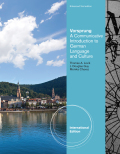
Vorsprung, enhanced international edition
Lovik, Thomas A.
Guy, J. Douglas
Chavez, Monika
VORSPRUNG, International Edition is an innovative and lively first-year program that uses a five-skills approach, emphasizing the acquisition of communicative as well as cultural competence without sacrificing attention to formal accuracy. Utilizing "focus on form" activities in an engaging, personalized fashion, VORSPRUNG helps students develop realistic abilities in speaking, listening, and reading German. The program presents a systematic, clear introduction to the essentials of German grammar and practices high-frequency structures andvocabulary in interactive activities. In addition, it provides students with the cultural knowledge that is relevant to their own lives and then asks them to compare their cultures to the habits and behaviors of the German-speaking people of Europe. In order to prepare students for successful communication in today's rapidly changing world, VORSPRUNG exposes them to a wealth of spoken and written authentic textual materials. To support this focus on spoken and written German, VORSPRUNG offers an array of in-class activities that fosters accuracy and provides ample opportunities for students to practice German in authentic contexts. INDICE: 1. FANGEN SIE BITTE AN. Anlauftext I: Annas Albtraum. Strukturen und Vokabeln. I. Understanding commands and requests. The imperative. A. Formation of the formal imperative. Wissenswerte Vokabeln: Aktivitäten im Klassenzimmer. B. The word bitte. Anlauftext II: Annas Traum. Brennpunkt Kultur: Greetings and farewells. Strukturen und Vokabeln. II. Describing yourself and others. A. The verb sein; subject pronouns. B. The pronoun you. Brennpunkt Kultur: Titles of address. III. Asking for someone's name. The verb heißen. Wissenswerte Vokabeln: das Alphabet. Wissenswerte Vokabeln: die Zahlen. Wissenswerte Vokabeln: Aussehen. IV. Asking for information and clarification. Question formation: A. Information questions B. Yes/no questions. V. Identifying People and Classroom Objects. A. Noun gender and number. Wissenswerte Vokabeln: das Klassenzimmer, der Hörsaal. B. The nominative case: definite articles der, das, die. Wissenswerte Vokabeln: die Farben. C. The nominative case: indefinite articles and kein. Sprache im Alltag: Abbreviated forms of ein. Wissenswerte Vokabeln: Länder und Nationalitäten. Brennpunkt Kultur: Where German is spoken. D. The nominative case. E. Pronoun substitution. 2. FAMILIE UND FREUNDE. Anlauftext: Anna Adler stellt sich vor. Wissenswerte Vokabeln: Annas Familie. Strukturen und Vokabeln. Wissenswerte Vokabeln: die Familie und die Verwandten Brennpunkt Kultur: German immigration to North America. I. Indicating possession or ownership. The verb haben. Sprache im Alltag: Abbreviated ich-forms of verbs. Sprache im Alltag: Expressions with the verb haben. Wissenswerte Vokabeln: Studienfächer. II. Expressing what you like and don't like. The expression gern haben. Brennpunkt Kultur: Types of universities in Germany. III. Describing actions. Present tense of regular verbs. A. Conjugation of regular verbs in the present tense. B. Present-tense equivalents in English and German. IV. Talking about what you like and don't like to do. Verbs + the adverb gern. A. Present tense of verbs with gern. B. Position of gern and nicht gern. V. Talking about what you have and don't have. The accusative case. A.Definite and indefinite articles. B. Masculine N-nouns. Absprungtext: Anna schreibt ein E-Mail. Wissenswerte Vokabeln: die Monate. Strukturen und Vokabeln.VI. Creating variety and shifting emphasis. Position of subject and verb. Wissenswerte Vokabeln: die Wochentage. Wissenswerte Vokabeln: Zeitausdrücke.Wissenswerte Vokabeln: die Uhrzeit. VII. Describing daily activities. Regularpresent-tense verbs: verbs with separable prefixes and two-verb constructions. Wissenswerte Vokabeln: Onkel Hannes' Alltag. VIII. Expressing negation. Position of nicht Zieltext: Annas E-mail. 3. WAS GIBT ES HEIDELBERG UND MANNHEIM ZU TUN. Anlauftext: Was halten wir von Anna? Was hält sie von uns? Spracheim Alltag: Assumptions with bestimmt, sicher, wahrscheinlich, and wohl. Brennpunkt Kultur: Mealtimes in German-speaking countries. Strukturen und Vokabeln.I. Describing activities. Present tense of stem-changing verbs. The verb wissen. Sprache im Alltag: es gibt, was gibt es... ?, and was gibt's? II. Expressing relationships or ownership. Nominative of possessive adjectives. III. Expressing additional and contrastive information and justifications. Coordinating conjunctions. IV. Stating personal preferences. The particle lieber. V. Expressing what you would like to do. The modal verb möchte. Wissenswerte Vokabeln: Lebensmittel. Brennpunkt Kultur: The metric system. Sprache im Alltag: Specifying amounts. Sprache im Alltag: Bitte schön. Absprungtext: Heidelberg und Mannheim. Brennpunkt Kultur: Heidelberg and Mannheim. Strukturen und Vokabeln. Wissenswerte Vokabeln: Freizeitaktivitäten. VI. Expressing possibilities. The modal verb können. VII. Referring to people and things. Accusative pronouns. VIII. Talking about people and things that you know. The verb kennen. IX. Expressing relationships or ownership. Accusative of possessive adjectives. X. Talking about more than one item. Noun plurals. Zieltext: Fahren wir nach Heidelberg oder nach Mannheim? Deutsch im Beruf 1. 3. UNTERWEGS. Anlauftext: Mutters Ratschläge. Sprache im Alltag: Assumptions with wohl and wahrscheinlich. Brennpunkt Kultur: Studienmöglichkeiten in Deutschland Strukturen und Vokabeln. Wissenswerte Vokabeln: das Gepäck. I. Telling friends or relatives to do something. The informal imperative. A. The du-imperative. B. The ihr-imperative. C. Particles with the imperative. D. Inclusive suggestions: the wir-imperative II. Expressing ability, fondness, and expected obligation. Modal verbs (I). A. Expressing ability: können. B. Expressing fondness and desire: mögen and möchte. C. Expressing expected obligation: sollen. Absprungtext: Fahrrad fahren: Sicherheitsinfo Nr 8. Brennpunkt Kultur: Fahrschule und Fahrrad fahren. Strukturen und Vokabeln III. Expressing permission, prohibition, necessity, and strong desire. Modal verbs (II). A. Expressing permission: dürfen. B. Expressing necessity: müssen. C. Expressing strong desire: wollen. D. Modal verb summary. Brennpunkt Kultur: Mit der Bahn fahren. Wissenswerte Vokabeln: Eigenschaften. IV. Expressing spatial movement, the recipient of something, opposition, and omission. Prepositions with the accusative. Zieltext: Endlich unterwegs! Brennpunkt Kultur: Frankfurt am Main. 4. FREUNDSCHAFTEN. Anlauftext: Die Geschichte von Tante Uschi und Onkel Hannes. Sprache im Alltag: Article with first names. Brennpunkt Kultur: Hansestadt Hamburg. Strukturen und Vokabeln I. Talking about past events. The conversational past. A. The auxiliaries haben and sein. B. Past participles. C. Prefixes of past participles. D. Past participles of sein and haben. Wissenswerte Vokabeln: das Wetter. Sprache im Alltag: ganz. Wissenswerte Vokabeln: die Jahreszeiten. Absprungtext: Freundsc
- ISBN: 978-0-495-91514-0
- Editorial: Heinle & Heinle
- Encuadernacion: Rústica
- Páginas: 592
- Fecha Publicación: 31/01/2011
- Nº Volúmenes: 1
- Idioma: Inglés
